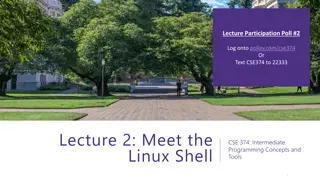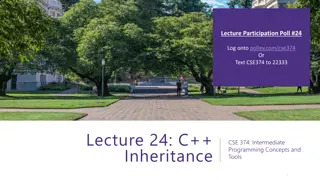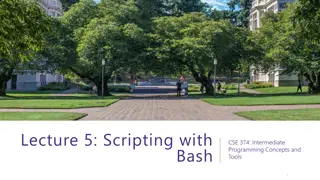
The Evolution of the English Language: A Historical Exploration
Explore the fascinating journey of the English language from its origins to the present day, delving into its Germanic roots, Old English period, and influences from other languages like Latin and French. Unravel the story of how English became a global language of communication.
Download Presentation

Please find below an Image/Link to download the presentation.
The content on the website is provided AS IS for your information and personal use only. It may not be sold, licensed, or shared on other websites without obtaining consent from the author. If you encounter any issues during the download, it is possible that the publisher has removed the file from their server.
You are allowed to download the files provided on this website for personal or commercial use, subject to the condition that they are used lawfully. All files are the property of their respective owners.
The content on the website is provided AS IS for your information and personal use only. It may not be sold, licensed, or shared on other websites without obtaining consent from the author.
E N D
Presentation Transcript
- : How did the English Language appear? : 6 76
People always wanted to communicate with each other: to understand and to know more about other countries and nations and collaborate with them. That s why people have been looking for a unique language to communicate. Today this place belongs to English. Languages have their own history. Studying the rise and growth of the language is no less exciting than studying the world history.
The aim of my work is to find out how the English Language appeared. The tasks of my work: To know who started to speak English for the first time When and where the language appeared How it became an i The actuality of my work: not only me, but also a lot of people wondered: how and where English language appeared. In our work we will find out how it happened. The problem of my work is, that many people who have learnt English for years don t know the history of the language. Hypothesis: During the process of language contact between English and other languages the vocabulary of English due to borrowings is very rich. nternational language
English is classified as a Germanic language because it shares innovations with other Germanic languages such as Dutch, German, and Swedish. These shared innovations show that the languages have descended from a single common ancestor called Proto-Germanic. Some shared features of Germanic languages include the use of modal verbs, the division of verbs into strong and weak classes, and the sound changes affecting Proto-Indo- European consonants, known as Grimm's and Verner's laws. English is classified as an Anglo-Frisian language because Frisian and English share other features, such as the palatalization of consonants that were velar consonants in Proto-Germanic. English Language
The old English period in the history of English covers the period from four hundred forty- nine to one thousand sixty-six. In four hundred and forty-nine the ancestors of the English Celts and Romans invaded the Germanic tribes of the English, Saxons, which are much larger than the local population. Thus, the English-Saxon dialect gradually supplanted the Celtic dialect, destroying or transforming existing words. Thanks to the Germanic tribes in English appeared many words with common roots of Germanic, which were also borrowed from Latin. These are words like "butter, Saturday, pound, inch". Old English
In the middle of the eleventh century, in the middle ages England was conquered by the French. So in the history of the English language began the era of three languages: French-for the aristocracy and the judiciary, Latin - for science and medicine, English-Saxon for the common people. The mixing of these three adverbs gave rise to the formation of the English, which today studies the whole world. In the fourteenth century, English became literary, that is, it became the language of education and law. Middle English
The next period in the history of English was Early Modern English (1500 1700). William Shakespeare is considered to be the founder of modern literary English. He purified the language, introduced many idioms, new words, which are now used for communication. In the early twentieth century, the globalization of the English language was facilitated by the colonial policy of the United Kingdom. In the middle of the last century, the world importance of the United States increased, which also contributed to the popularity of the American version of the language. English has long been not only the language of international communication number one, but also the language of science, media, education, technology. New English
English as a global language Modern English, sometimes described as the first global lingua franca, is also regarded as the first world language. English is the world's most widely used language in newspaper publishing, book publishing, international telecommunications, scientific publishing, international trade, mass entertainment, and diplomacy. English used to have parity with French and German in scientific research, but now it dominates that field. By the time of the foundation of the United Nations at the end of World War II, English had become pre-eminent and is now the main worldwide language of diplomacy and international relations. It is one of six official languages of the United Nations. Many other worldwide international organizations, including the International Olympic Committee, specify English as a working language or official language of the organization.
English, besides forming new words from existing words and their roots, also borrows words from other languages. This process of adding words from other languages is commonplace in many world languages, but English is characterized as being especially open to borrowing of foreign words throughout the last 1,000 years. French words from various periods of the development of French now make up one-third of the vocabulary of English. English has also borrowed many words directly from Latin, the ancestor of the Romance languages, during all stages of its development. Word origins
Conclusion While working on my research I found out many interesting facts about English Language. Now I know, that English Language has a long and rich history, I found out, that Old English is very different from Modern English and difficult for 21st-century English speakers to understand. English is an immensely rich language in terms of vocabulary, containing more synonyms than any other language. I found out, that the mother of all languages is Latin. That s why knowing English, it s very easy to learn another foreign language. English is very popular, interesting and old language, it has big globalization and a lot of countries use it for life and job.
List of literature 1.https://englishfull.ru/znat/istoriya-anglijskogo.html 2.https://ru.wikipedia.org/wiki/ _ 3.http://fb.ru/article/162805/kak-poyavilsya-angliyskiy- yazyik-istoriya-poyavleniya-angliyskogo-yazyika 4.https://www.native-english.ru/articles/history 5."How English evolved into a global language". BBC. 20 December 2010. Retrieved 9 August 2015.







